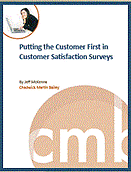 The recent NY Times’ article about people's exhaustion with customer satisfaction surveys made the CMB email rounds in record time. The gist of the article is that people are tired of being asked to fill out customer satisfaction surveys before, after, and during every minor transaction they have with a company. They especially don’t like being pressured by a pleading cashier to “please help me out” and take a survey.
The recent NY Times’ article about people's exhaustion with customer satisfaction surveys made the CMB email rounds in record time. The gist of the article is that people are tired of being asked to fill out customer satisfaction surveys before, after, and during every minor transaction they have with a company. They especially don’t like being pressured by a pleading cashier to “please help me out” and take a survey.
As a company with specialties in customer experience and loyalty—analysis that is dependent on customer feedback—the piece hit a nerve. And the takeaways from the article are worth discussing in a bit more detail:
On the surface there’s not much news here, asking screen upon screen of questions is going to negatively impact more than just response rates, it makes people cranky. The article mentions an excellently titled blog post Infant Who Begins Babies “R” Us Customer Satisfaction Survey Dies of Old Age from a woman who wrote about her displeasure at being asked to complete a questionnaire of more than 45 questions. And it certainly matches up with our findings that ideal survey length is 3 to 6 minutes—any shorter and you may not be giving the respondent enough time to answer, too much longer and you risk making them feel like you don’t value their time.
To incent or not to incent...
that is the question. The answer is a bit more complicated than the Times article suggests. The article quotes Vanderbilt University Management Professor Robert Oliver: “The frequent requests to fill out these surveys, especially with no incentives, have been so annoying that people just stop doing it.” And while it’s true that a subset of survey takers are motivated primarily by monetary incentives or free gifts, the top motivation for more people is a desire to improve the company, its products or services. Saying thank you and letting people know that the collected information will improve service is an effective incentive in itself.
Just because you can, doesn’t mean you should
As the article says, the availability of online surveys, free apps, and mobile platforms, means anyone can administer a survey pretty much anywhere. This is problematic, not only because good questionnaire design and data analysis requires specialized skills, but because a constant barrage of questions can feel like harassment.
I love surveys and I will take one anytime I can, but even I don’t like the feeling of being pressured by cashiers, or forced to answer questions before I complete a transaction. There is a difference between asking people for their time to help improve the company and browbeating them into providing data. A moratorium on forcing customers to answer questions before their card goes through at the register would be an excellent start.
Make a plan before you survey
One of the problems we see, that the Times article doesn’t cover, is the distressing fact that two-thirds of companies report problems with managers not knowing what to do with the data. Many companies are collecting data with no idea how to apply it or improve the customer experience. Without a focused plan for addressing and applying customer feedback, companies are just going through the motions, and that's a loss for customers and companies alike.
Learn more about our strategic approach to customer satisfaction surveys and best practices in our free download: Putting the Customer First in Customer Satisfaction Surveys
Posted by Megan McManaman. Megan is CMB's Content Marketing Manager. She is having a lot of fun with the 1940 Census data and recently realized her dream of taking the American Community Survey.


